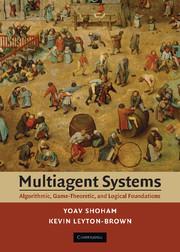Book contents
- Frontmatter
- Contents
- Credits and Acknowledgments
- Introduction
- 1 Distributed Constraint Satisfaction
- 2 Distributed Optimization
- 3 Introduction to Noncooperative Game Theory: Games in Normal Form
- 4 Computing Solution Concepts of Normal-Form Games
- 5 Games with Sequential Actions: Reasoning and Computing with the Extensive Form
- 6 Richer Representations: Beyond the Normal and Extensive Forms
- 7 Learning and Teaching
- 8 Communication
- 9 Aggregating Preferences: Social Choice
- 10 Protocols for Strategic Agents: Mechanism Design
- 11 Protocols for Multiagent Resource Allocation: Auctions
- 12 Teams of Selfish Agents: An Introduction to Coalitional Game Theory
- 13 Logics of Knowledge and Belief
- 14 Beyond Belief: Probability, Dynamics, and Intention
- Appendices: Technical Background
- Bibliography
- Index
6 - Richer Representations: Beyond the Normal and Extensive Forms
Published online by Cambridge University Press: 05 June 2012
- Frontmatter
- Contents
- Credits and Acknowledgments
- Introduction
- 1 Distributed Constraint Satisfaction
- 2 Distributed Optimization
- 3 Introduction to Noncooperative Game Theory: Games in Normal Form
- 4 Computing Solution Concepts of Normal-Form Games
- 5 Games with Sequential Actions: Reasoning and Computing with the Extensive Form
- 6 Richer Representations: Beyond the Normal and Extensive Forms
- 7 Learning and Teaching
- 8 Communication
- 9 Aggregating Preferences: Social Choice
- 10 Protocols for Strategic Agents: Mechanism Design
- 11 Protocols for Multiagent Resource Allocation: Auctions
- 12 Teams of Selfish Agents: An Introduction to Coalitional Game Theory
- 13 Logics of Knowledge and Belief
- 14 Beyond Belief: Probability, Dynamics, and Intention
- Appendices: Technical Background
- Bibliography
- Index
Summary
In this chapter we will go beyond the normal and extensive forms by considering a variety of richer game representations. These further representations are important because the normal and extensive forms are not always suitable for modeling large or realistic game-theoretic settings.
First, we may be interested in games that are not finite and that therefore cannot be represented in normal or extensive form. For example, we may want to consider what happens when a simple normal-form game such as the Prisoner's Dilemma is repeated infinitely. We might want to consider a game played by an uncountably infinite set of agents. Or we may want to use an interval of the real numbers as each player's action space.
Second, both of the representations we have studied so far presume that agents have perfect knowledge of everyone's payoffs. This seems like a poor model of many realistic situations, where, for example, agents might have private information that affects their own payoffs and other agents might have only probabilistic information about each others' private information. An elaboration like this can have a big impact, because one agent's actions can depend on what he knows about another agent's payoffs.
Finally, as the numbers of players and actions in a game grow—even if they remain finite—games can quickly become far too large to reason about or even to write down using the representations we have studied so far.
- Type
- Chapter
- Information
- Multiagent SystemsAlgorithmic, Game-Theoretic, and Logical Foundations, pp. 141 - 188Publisher: Cambridge University PressPrint publication year: 2008

